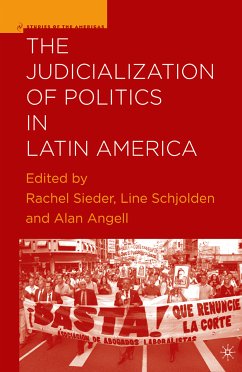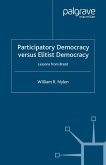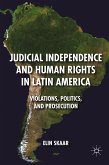Dieser Download kann aus rechtlichen Gründen nur mit Rechnungsadresse in A, B, BG, CY, CZ, D, DK, EW, E, FIN, F, GR, HR, H, IRL, I, LT, L, LR, M, NL, PL, P, R, S, SLO, SK ausgeliefert werden.
'This book eloquently maps the judicialization of politics in contemporary Latin America and its consequences. It weaves politics, law and society together into a rich and sophisticated analysis of the inter-relationship between judicialization and Latin American democracy in the 1990s and 2000s. Its comparative framework makes a valuable contribution to our understanding of how judicialization enables and constrains democratization and the search for justice. This is an impressive and original work that fills an important gap in the literature.' - David Sugarman, Professor at Law School, Lancaster University, UK
'This book is essential reading to understand the important new trend of judicial activism in Latin America. Does it strengthen democracy by enhancing individual rights, the ruleof law, the propriety of the exercise of power, and electoral fairness? Or as part of a 'judicialization of politics', is it the expression of an unwarranted instrumentalization of the judiciary by powerful actors as well as an extension of judicial authority over domains best left to political negotiations in governmental and legislative arenas? Does it, then, undermine rather than contribute to deepening the quality of democracy? In a set of highly nuanced analysis the authors provide evidence for all these assessments.' - J. Samuel Valenzuela, Kellogg Institute
'The book should be of interest to policy-makers and practitioners alike. Political scientists and legal scholars will all find food for thought and directions for future research. Its mixture of US, European and Latin American perspectives and forthcoming translation into Spanish also make this one of those rare works which promises to provoke and sustain genuine exchange and dialogue'. - Cath Collins, International Affairs
'All the chapters are written by experts in the field and are of high quality, combining a precise analysis of each specific case with reflection on the factors driving judicialisation, its potential and the risks it presents for democracy...This volume opens important avenues for a rigorous analysis of judicialisation in Latin America and covers a broad range of themes and countries.' - Rodrigo Uprimny - Latin American Studies









